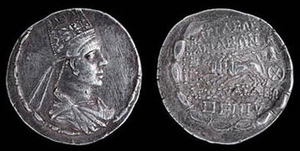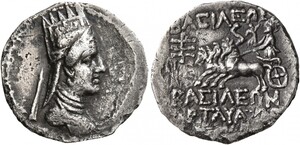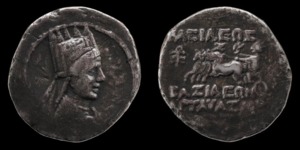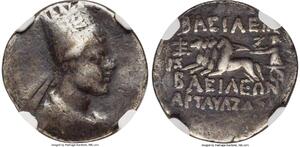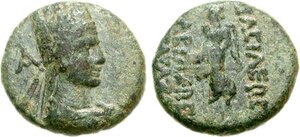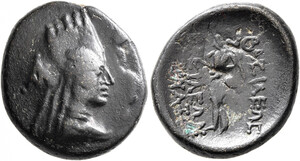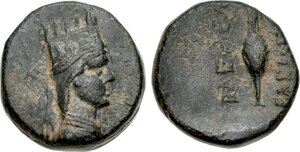Artavasdes II 56-34 BC
Description
Artavasdes II, son of Tigranes the Great and Queen Cleopatra of Pontus, inherited a truncated Armenia caught between Rome and Parthia. He proved an astute but ultimately ill-fated ruler who strove to preserve Armenian autonomy through shifting alliances. Early in his reign, Artavasdes maintained his father’s pro-Roman stance. In 53 BC, when the Roman Triumvir Crassus marched against Parthia, Artavasdes offered him 10,000 Armenian cavalry and urged Crassus to take the safer route through Armenia. Crassus refused and met disaster at Carrhae. In the aftermath, Parthian King Orodes II invaded Armenia, pressuring Artavasdes to switch sides. To secure peace, Artavasdes betrothed his sister to Orodes’ son, Prince Pacorus – a diplomatic marriage that sealed an Armenian-Parthian alliance and kept Armenia free of Parthian armies for a time.
For the next two decades, Artavasdes II delicately balanced relations with the superpowers. He even engaged in regional politics on Armenia’s terms, at one point quarreling and negotiating with the Median king (also named Artavasdes) as an equal. However, when Rome reasserted itself under Mark Antony in the 30s BC, Artavasdes attempted another pivot. In 36 BC, Antony launched a campaign against Parthia and requested Armenian support. Artavasdes, wary but seeing an opportunity, provided troops for Antony’s offensive into Media. The campaign stalled and Antony, frustrated by defeat (which occurred in Armenia’s vicinity), blamed Artavasdes for allegedly withdrawing support at a critical moment. The Armenian king had in fact prioritized his own safety and perhaps negotiated separately with the Medes – actions that Antony viewed as perfidy.
In 34 BC, Antony took revenge. Invited to a meeting under false pretenses, Artavasdes II was seized by Roman forces. Antony looted the Armenian royal treasuries and marched Artavasdes, in golden chains, to Alexandria. There the proud Armenian king and his family were paraded in a mock “triumph” before Queen Cleopatra VII. Artavasdes refused to prostrate himself to Cleopatra – a defiant gesture noted even by Roman historians as high-spirited dignity. He was kept prisoner until 31 BC, when Octavian’s victory at Actium led to Artavasdes’ execution by Cleopatra’s order. His death incited Armenian resistance; almost immediately, his son Artaxias II rallied the nation to expel Roman garrisons, showing that Armenia’s spirit of independence endured beyond Artavasdes II’s sacrifice.
For the next two decades, Artavasdes II delicately balanced relations with the superpowers. He even engaged in regional politics on Armenia’s terms, at one point quarreling and negotiating with the Median king (also named Artavasdes) as an equal. However, when Rome reasserted itself under Mark Antony in the 30s BC, Artavasdes attempted another pivot. In 36 BC, Antony launched a campaign against Parthia and requested Armenian support. Artavasdes, wary but seeing an opportunity, provided troops for Antony’s offensive into Media. The campaign stalled and Antony, frustrated by defeat (which occurred in Armenia’s vicinity), blamed Artavasdes for allegedly withdrawing support at a critical moment. The Armenian king had in fact prioritized his own safety and perhaps negotiated separately with the Medes – actions that Antony viewed as perfidy.
In 34 BC, Antony took revenge. Invited to a meeting under false pretenses, Artavasdes II was seized by Roman forces. Antony looted the Armenian royal treasuries and marched Artavasdes, in golden chains, to Alexandria. There the proud Armenian king and his family were paraded in a mock “triumph” before Queen Cleopatra VII. Artavasdes refused to prostrate himself to Cleopatra – a defiant gesture noted even by Roman historians as high-spirited dignity. He was kept prisoner until 31 BC, when Octavian’s victory at Actium led to Artavasdes’ execution by Cleopatra’s order. His death incited Armenian resistance; almost immediately, his son Artaxias II rallied the nation to expel Roman garrisons, showing that Armenia’s spirit of independence endured beyond Artavasdes II’s sacrifice.
Collection Tree
- ANCIENT
- Armenia Major
- Artavasdes II 56-34 BC
- Armenia Major




